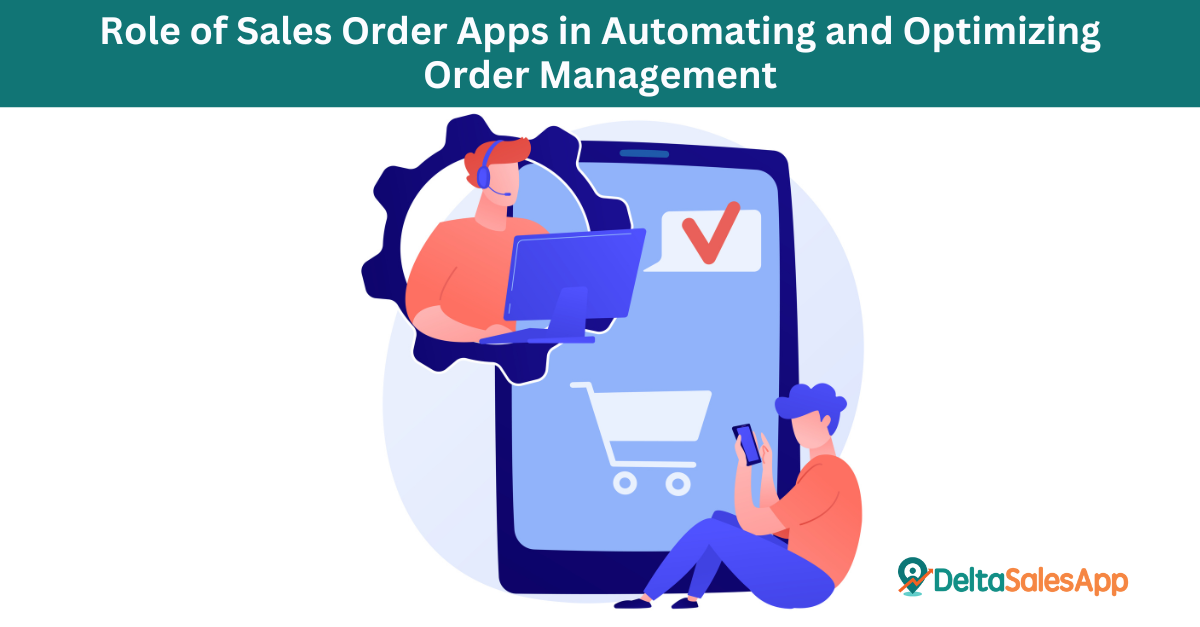Role of Sales Order Apps in Automating and Optimizing Order Management

In the modern business environment, staying ahead of the competition is no longer a matter of just having a superior product or service. It’s about making every process in your organization as efficient and streamlined as possible. One area where businesses often face inefficiencies is in their sales operations, particularly when it comes to order management. This is where a sales order app becomes a pivotal tool.
A sales order app isn’t just a software; it’s an integrated solution that can revolutionize the way businesses process, track, and manage orders. Whether you’re leading a growing startup or managing an established corporation, adopting the right sales order app can drastically improve your order management process, save valuable time, and increase operational accuracy. By automating the entire order cycle and synchronizing with other core business systems, sales order apps help businesses meet customer demands faster, more efficiently, and with fewer errors.
Let’s take a deep dive into how a sales order app can unlock operational efficiencies, boost productivity, and ensure customer satisfaction, while positioning your business for scalable growth in today’s fast-paced digital world.
Defining the Sales Order App: A Game-Changer for Modern Businesses
At its heart, a sales order app is an intuitive software tool designed to simplify and automate the creation, tracking, and management of customer orders. This software solution is more than just an order entry system—it helps businesses enhance the entire order lifecycle, from when the customer places an order to the moment it’s delivered and invoiced.
These apps typically integrate with other business systems—such as Customer Relationship Management, Enterprise Resource Planning (ERP), and accounting software—ensuring that data flows seamlessly between departments. This centralized approach minimizes errors, optimizes inventory management, and ensures that businesses can fulfill orders quickly and accurately.
The main advantage of using a sales order app lies in its ability to automate routine tasks, such as order entry, invoicing, and inventory checks. This eliminates the need for manual data entry, reducing human errors and speeding up the order process, all while providing real-time insights into critical metrics that can influence business decisions.
Why Your Business Needs a Sales Order App?
In the increasingly competitive marketplace, businesses must adopt tools that can keep them agile, efficient, and capable of meeting the ever-growing demands of their customers. Here are several reasons why investing in a sales order app is no longer optional but essential:
1. Time-Saving Automation
One of the most significant advantages of a sales order app is the time it saves by automating routine tasks. Traditionally, sales teams and managers would spend hours entering orders manually, processing invoices, and communicating with field reps. This not only takes time but also increases the chances of human error. By automating these tasks, a sales order app significantly reduces the time spent on administrative work, allowing your team to focus on higher-value activities that drive growth.
2. Minimized Errors and Enhanced Accuracy
Manual processes are prone to mistakes, from entering incorrect quantities to miscalculating prices. A sales order app mitigates these risks by automating order entry and cross-checking orders with live inventory levels, pricing, and customer information. This leads to more accurate orders, fewer returns or complaints, and, ultimately, higher customer satisfaction.
3. Seamless Communication Across Teams
A well-designed sales order app centralizes communication by allowing all team members—whether in the office, field, or at remote locations—to have access to real-time updates on order statuses, inventory levels, and customer data. Features like automatic order updates, real-time tracking, and shared dashboards ensure that everyone, from field reps to sales managers, stays informed. This eliminates the need for constant back-and-forth emails or phone calls, allowing teams to act quickly and decisively.
4. Enhanced Customer Experience
Customer expectations have skyrocketed in the digital age. A sales order app allows businesses to exceed those expectations by offering more efficient order processing, faster response times, and real-time order tracking. When customers can track their orders, receive timely updates, and experience fewer errors, they’re more likely to stay loyal to your brand, which in turn boosts customer retention rates and lifetime value.
5. Data-Driven Decision Making
With a sales order app, businesses gain valuable insights into customer behavior, sales trends, and inventory levels. These insights are powered by real-time analytics, enabling business leaders to make informed decisions about pricing strategies, inventory management, and demand forecasting. This data-driven approach helps businesses stay one step ahead of market changes and ensure they always have the right products in stock.
6. Cost Efficiency and Improved Profit Margins
By automating routine tasks, reducing errors, and providing better insights into inventory and sales trends, a sales order app helps businesses lower operational costs. The reduction in human errors alone can save significant amounts of money, as businesses no longer need to handle costly returns or manage inventory discrepancies. Additionally, by having a clear view of sales patterns, businesses can reduce waste and better optimize their stock levels, improving overall profitability.
Must-Have Features of a Top-Notch Sales Order App
To truly unlock the potential of your sales operations, it’s essential to choose a sales order app that comes equipped with features that meet your business’s specific needs. Here are the essential features that make a sales order app indispensable:
1. Real-Time Order Tracking and Updates
Whether customers place orders through your website, over the phone, or through field sales reps, it’s crucial to have a real-time system that tracks every order. A great sales order app should allow businesses to monitor the status of each order from creation to delivery, ensuring that customers stay informed every step of the way.
2. Integrated Inventory Management
An ideal sales order app integrates seamlessly with inventory management systems. This integration provides live updates on stock levels, allowing sales teams to instantly check product availability before confirming an order. This prevents over-selling and stockouts, which can damage a business’s reputation and bottom line.
3. Automated Invoicing and Billing
A robust sales order app automatically generates invoices and billing details once an order is confirmed, eliminating manual input and reducing the risk of errors. This functionality speeds up the order-to-cash cycle and ensures that invoicing is accurate and timely.
4. Customer Relationship Management (CRM) Integration
For better customer engagement, the sales order app should integrate with CRM systems. This gives sales reps a 360-degree view of each customer, including order history, preferences, and past interactions. With this information, your team can offer personalized recommendations and more targeted sales efforts.
5. Mobile Accessibility for Field Sales Teams
For companies that rely on field sales reps, a sales order app should be mobile-friendly. Sales reps should be able to place orders, check inventory levels, and update order statuses while on the move, whether they’re meeting clients at their location or in transit. Mobile access increases efficiency and ensures that orders are placed accurately, even outside the office.
6. Automated Reporting
Sales managers often spend countless hours consolidating sales data and creating reports. A good sales order app automates this process, generating real-time reports that highlight key metrics like sales volume, order status, customer trends, and more. This automation allows managers to focus on analyzing data, making informed decisions, and driving strategic growth.
7. Expense Management and Reporting
Tracking field sales expenses such as travel, lodging, and client meals is crucial for businesses that operate outside of traditional office settings. A comprehensive sales order app should include features that allow sales reps to submit and track their expenses, making it easier for businesses to manage field operations and ensure proper reimbursements.
8. Order Approval and Workflow Management
Businesses with complex approval processes for high-value orders or custom purchases will benefit from a sales order app that supports order approval workflows. This feature streamlines the approval process by automating notifications and approval steps, reducing delays and bottlenecks.
Delta Sales App: A Field Sales Revolution
For companies with field sales teams, Delta Sales App takes sales order management to the next level. Here’s how it streamlines and automates the entire field sales order process:
- Real-Time Order Placement on the Go: Field reps can place orders directly from their mobile devices, eliminating manual order entry and reducing errors.
- Credit Limit & Balance Checks: Reps can check customers' credit limits and balances in real time, helping to avoid order issues or delays.
- Order Sharing via WhatsApp & Email: Once an order is placed, reps can instantly share order details with clients or team members through email or WhatsApp.
- Easy Order Management for Sales Managers: Sales managers can track, filter, and sort orders without having to manually gather data from field reps.
- Real-Time Order Status Updates: Sales reps can update order statuses directly within the app, ensuring that everyone stays informed.
- Comprehensive Reporting & Expense Tracking: Automated reporting features and expense management tools help sales managers track performance and manage costs efficiently.
Conclusion: A Necessity for Business Growth
In the digital age, relying on outdated methods for managing sales orders is no longer an option. Implementing a sales order app is a powerful way to streamline your sales operations, improve customer service, and enhance your overall business efficiency. For businesses with field sales teams, apps like the Delta Sales App bring added value by automating field order management, offering real-time insights, and optimizing workflows.
Whether you're a small business looking to scale or a large enterprise aiming to streamline operations, investing in the right sales order app is one of the smartest decisions you can make. By embracing this technology, your business can improve accuracy, increase efficiency, and deliver better customer experiences—all of which ultimately lead to higher profitability and growth.
FAQs
1. What is a sales order app?
A sales order app is a software solution designed to automate and streamline the process of creating, managing, and tracking customer orders. It integrates with other business systems like CRM, inventory management, and financial software, allowing businesses to reduce manual errors, speed up order fulfillment, and improve overall operational efficiency.
2. How does a sales order app improve efficiency?
A sales order app improves efficiency by automating key processes like order entry, invoicing, inventory checks, and reporting. This reduces the time spent on manual tasks, minimizes errors, and speeds up the order-to-cash cycle, allowing your team to focus on more strategic and customer-centric activities.
3. Can a sales order app integrate with other business tools?
Yes, most modern sales order apps integrate seamlessly with a variety of business tools, such as CRM systems, inventory management software, ERP systems, and accounting platforms. This integration ensures that all business functions are synchronized and data is consistently updated across systems, reducing the need for manual data entry.
4. What features should I look for in a sales order app?
Key features to look for include:
- Real-time order tracking and updates
- Inventory management and live stock updates
- Automated invoicing and billing
- Customer relationship management
- Mobile access for field sales teams
- Automated reporting and analytics
- Expense tracking and management
- Order approval and workflow management
5. How can a sales order app improve customer satisfaction?
A sales order app helps improve customer satisfaction by ensuring faster order processing, accurate deliveries, and better communication throughout the order lifecycle. With real-time order tracking, customers can stay informed on the status of their orders, which leads to a more transparent and seamless experience. Additionally, fewer order errors lead to fewer returns and complaints, enhancing overall customer experience.
6. How does a sales order app help reduce errors?
By automating the order entry process and integrating with inventory and pricing systems, a sales order app reduces human errors such as entering incorrect quantities, pricing mistakes, and missing orders. This ensures that all orders are processed accurately and reduces costly mistakes that can harm customer relationships.









